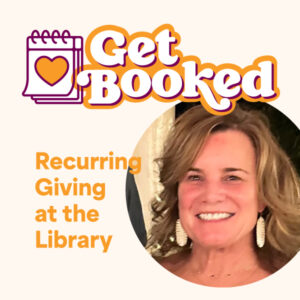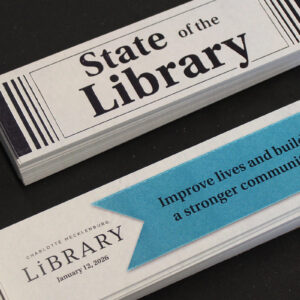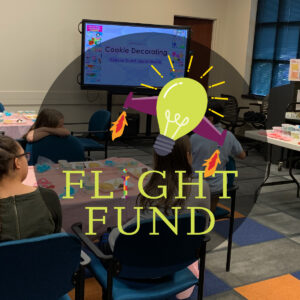By Isolde Karro
Before we get started, there’s something you should know. I’m 51 years old, and I’ve never set foot inside a public library.
I know what you’re thinking. It’s okay … I think it, too. I was an English major! Chalk it up to childhood memories of being loudly shushed in middle school and, boom, a formative experience was cemented.
Why do I confess this embarrassing shortcoming to you? To shamelessly GRAB YOUR ATTENTION and tell you what I’ve learned about our remarkable Library system from its talented, caring, smart and funny Library staff — through volunteering.
Convening People: Libraries bring communities together
Much to my surprise, today’s libraries are anything but quiet. The Charlotte Mecklenburg Library is like a bustling city where you can choose your own adventure every day. Each one of its 21 branches is a mini town center where people regularly connect with each other to learn, do and grow.
Hyperbole? NO.
Visit the Events page of the Library website and you’ll find entry-after-entry of free educational, informational, and fun programming for everyone — from newborns to retirees. I know because I perused all 400 pages.
I haven’t included any links because I want you to keep reading, but here’s a few hot takes:
- There are dance parties for babies to stimulate their brains through music, language and socialization.
- Elementary school kids can get help with homework from trained volunteers to answer questions and practice skills.
- Run out of ideas for dinner? There are cooking demonstrations! (Shef Shaun — You were right about cutting out sugar. My elbows do feel better.)
- If you’re new or returning to the job market, Library staff can help you polish your resume, do mock interviews and review computer basics.
- There’s even a list of local mentors from different trades and professions who will share their experiences with you. It’s like checking out a living resource to get more information on … life.
And none of this programming is off the proverbial shelf (I had to get that pun in here somewhere). It’s all customized. Because every community is different and each branch — big and small — is unique.
I mean, librarians really have to know their beat. THIS is why there’s no more shushing in the library. Because convening people — truly bringing communities together — means hearing what they have to say.
Top five “OMG, you can do THAT at the Library?” moments
1. Influencers can record podcasts.
The Learn2Earn program is running at Hickory Grove, West Boulevard, Allegra Westbrooks, and Sugar Creek Libraries.
Supporting Health & Wellness: Libraries meet people where they are
What does listening “look” like in action? Well, even though I don’t know you, I can still imagine you running into someone you regularly see. You make eye contact, you read their body language, and as you throw open your arms to greet them, you warmly say (in your best Oprah Winfrey voice): “Omigosh, how have you been?” And you listen.
Sometimes it’s just that easy.
Oftentimes, at the Library, it’s more complicated. The answer to this simple question can be … I need a hot meal … a dry place to go … a safe place to sleep. I need help with addiction, depression, trauma. Or, I don’t know — but something’s wrong and I don’t know what to do.
Libraries see these kinds of crisis multiple times a day, every day. In a recent survey, Library staff revealed they want more interventional training and closer collaboration with social services and healthcare organizations to best help the most vulnerable in their communities.
Starting in March, Charlotte Mecklenburg Library is partnering with Mental Health America to offer staff at all 21 branches bespoke training on the specific emergencies they encounter (remember, each community is different) and how to connect people with the right care. The County will also teach de-escalation techniques, so every situation is approached calmly, kindly and safely.
As the Library builds on its original mission of providing free access to books for all … to more fully connecting people’s physical, mental and emotional needs with the right resources (yes, books, and also programming, social services, empathy, compassion, commonality), all of our communities benefit. If you’re looking for proof, check out the story about the Mayor of Midwood on page 10.
It’s this evolution from the transactional to the relational that creates a special experience every time a person walks through that Library door. Silence in these hallowed halls is no longer an option.
In a recent survey, Library staff requested interventional training and closer collaboration with social services. In response the Library is creating a curriculum with Mental Health America to provide staff with the tools they need to help their most vulnerable customers.
Pictured: Lonna Vines, branch manager at Myers Park Library.
Growing for the Future: Libraries expand where needed
A few minutes before meeting with David Dillard, the real estate director for the Library, I kinda freaked out. What were we gonna talk about? After fumbling though my introduction, I blurted out: “Tell me what makes you proud of working with the Library.”
Great. I just asked a brick-and-mortar person about their feelings.
And the next 25 minutes were amazing! Because like every other aspect of the Library, even real estate is about asking questions and listening.
The real estate team talked to Library leaders and staff about their experiences on the ground. They went into communities again and again and AGAIN to learn about their unique needs. They “heard” the maps telling them about underserved areas and they “listened” to the census data predict where the next population boom would erupt.
After racking and stacking based on urgency, developing cost estimates, meeting with the County Commission — going back to the County Commission — the team presented a facilities master plan (let’s call it a central strategy) to best serve the County with physical infrastructure for the next 15 years. You can find the full document on the Library’s website under About Us ◊ Building Projects.
So out of all this, what is David proud of?
His stream of consciousness answer started with securing funding for some pretty big wins for the community:
- Moving Sugar Creek Library to a building double its current size for larger program space, more study rooms and a bigger collection area.
- Relocating and expanding West Boulevard Library — taking it from 12,500 to 20,000 sq. ft.
- Working with the County to include a library in their new Community Resource Center on Nations Ford Road.
- Approval to buy land for new branches in Prosperity Village, the Eastland area and the Thomasboro/Hoskins neighborhood.
But that’s where he revealed a secret. Real estate isn’t about the physical infrastructure … it’s about what the Library and its partners do inside the real estate that matters.
He told me a story about being a little boy, climbing into his mom’s lap where she would read to him. He wants that experience for every child because literacy enhances the educational, economic and health outcomes for communities. The Library is more than checking out books. It’s about learning how to read, how to read to a child, where to find information and what to do with it. It’s about accessing programs and resources — and transforming your life with them.
And thanks to your contributions, David and his team and Mecklenburg County are working with resources that can pay dividends immediately and into the foreseeable future.
Five trends making libraries the next-gen “third place”
1. Borrowing books saves money! It’s totally free with a Library card.
Tour new Main Library in 3D with our virtual reality experience, available at any of our Around the World in 21 Branches events.
The Story Doesn’t End Here
My experience volunteering with the Library is just that — one person’s broad account of something much bigger than themself. It’s actually impossible for me to tell you everything there is to know about the Library because it’s a living, breathing being whose never-ending story is being written in real time by more than one million people across Mecklenburg County.
But one consistent theme came out of every interaction over the last few weeks … the Library is about sharing knowledge.
Thank you to Sugar Creek Library, Independence Regional Library, Hickory Grove Library and branch manager Viviette White, Plaza Midwood Library and branch manager Catherine Haydon, real estate director David Dillard, and the Library Foundation for sharing what you know.
Here’s what you taught me:
- Libraries spaces, programs and services connect our communities.
- People with widely different needs from wildly different backgrounds use our libraries.
- Library staff welcome them ALL with open arms and helping hands.
- All of it is free of charge at a time when everything else comes at an increasing cost.
- Growing this critical institution is more important now than ever before.
So now that you’ve come this far, I can tell you the truth. I have actually been in a library or two — many, many moons ago. But clearly, I am overdue in returning and it’s about time I got myself a library card. Shhh … I’m working on it!
Three cheers for supporting the Library
1. With a long history of public service, this trusted institution has adapted to the needs of the community.
2. The Library is a model for public-private partnerships, amplifying County dollars with generous gifts that punch way above their weight.
3. You get a lot of bang for your (philanthropic) buck. A large majority of Americans (77%) reported that libraries provide them with the resources they need. This is especially true for young people: 84% of those between 16 and 29 say this.
Despite her candor about library attendance, writer Isolde Karro loves to read. Her favorite book is John Irving’s A Prayer for Owen Meany. She lives in Huntersville with her husband Jerry, her dog Penny, and cat Peso. In addition to reading, she enjoys Doritos and Law & Order.




